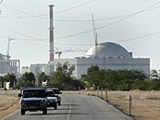|
|
TODAY.AZ / Politics
West gives Iran July 12 to stop enrichment
03 July 2006 [22:15] - TODAY.AZ

The envoys - some of them senior U.N. diplomats, and all familiar with details of the six-nation drive to persuade Iran to compromise on its nuclear activities - spoke just two days before a key Iran-European Union meeting in Brussels meant to make clear to the Iranians that their time is running out.
According to the Associated Press agency, on Wednesday, senior EU envoy Javier Solana will urge top Iranian nuclear negotiator Ali Larijani to commit his country immediately to suspending enrichment and starting negotiations, the diplomats said.
They also said Russia and China were closer than ever to supporting the West on U.N. Security Council action - including sanctions - if Tehran refuses the package of incentives meant to wean it off enrichment.
"We are looking forward to hear from Iran ... the official response," said Cristina Gallach, Solana's spokeswoman.
A European official outlined more realistic expectations, saying Larijani would likely come back with questions - and perhaps a counterproposal.
If so, the diplomats said, Solana plans to tell him Iran must accept the terms of the package by July 12, when foreign ministers of the five permanent Security Council nations and Germany consult in Paris.
"If Iran has not answered positively by this date, the ministers will likely adopt a decision to resume negotiations on the Security Council resolution," said one of the diplomats, who, like the European official, demanded anonymity in exchange for divulging the game plan on Iran.
The European official said Russia and China were contemplating sending high-level officials to Wednesday's meeting in a symbolic show of unity with the West.
Work on a U.N. Security Council resolution was suspended May 3 to allow the six powers to draw up a plan of perks if Iran agrees to a long-term moratorium on enrichment - or punishments that include the threat of selective U.N. sanctions if it doesn't. Solana last month presented the rewards to Larijani but made no mention of the punishments, so as not to rile Tehran.
While Iran argues it has a right to the technology under the Nuclear Nonproliferation Treaty to generate power, there is increasing international concern that it wants to enrich uranium to weapons-grade levels for use in the fissile core of nuclear warheads.
Iranian officials have said they would not respond to the six-power offer before mid-August, a gambit described by one of the diplomats as an attempt to stall beyond the July 15-17 summit of the Group of Eight industrialized nations in Russia.
Before the summit, the United States and its allies on the Security Council - all G-8 members - "can apply pressure on Russia" to stand with the West on Iran, but that lever will be weakened after the St. Petersburg meeting, one diplomat said.
Possible U.N.-mandated sanctions include a visa ban on government officials, freezing assets, blocking financial transactions by government figures and those involved in the country's nuclear program, an arms embargo and a blockade on the shipping of refined oil products to Iran. Rewards include providing Iran with nuclear expertise and hardware, including reactors.
Breaking with a more than 2-decade-old ban on high-level diplomatic contact with Tehran, the United States said in late May that it was ready to join in such talks.
But the Americans, along with Russia, China, Britain, France and Germany - the six nations that endorsed the package - insist that Iran suspend its nascent enrichment activities before talks begin.
Tehran repeatedly has rejected that demand since the six powers agreed on the package in Vienna on June 1.
URL: http://www.today.az/news/politics/27816.html
 Print version
Print version
Connect with us. Get latest news and updates.
See Also
- 18 February 2025 [15:52]
Azerbaijan's Speaker of Parliament Meets Indonesian Counterpart at Asia Parliamentary Assembly - 18 February 2025 [15:31]
Azerbaijan, Pakistan discuss strategic partnership at Asia Parliamentary Assembly - 18 February 2025 [15:25]
President Ilham Aliyev inspects construction progress at nursery-kindergarten No.1 in Aghdam city - 18 February 2025 [15:07]
Attempt to smuggle 8 kg of narcotics from Iran to Azerbaijan thwarted - 18 February 2025 [13:45]
President Ilham Aliyev reviewed conditions at “Aghdam Residence” residential complex - 18 February 2025 [13:16]
President Ilham Aliyev examines construction progress at Aghdam Mugham Center - 18 February 2025 [13:11]
President Ilham Aliyev attends inauguration of Aghdam Regional Digital Management Center and Training and Education Complex - 18 February 2025 [13:07]
President Ilham Aliyev, First Lady Mehriban Aliyeva review ongoing construction of Hilton Garden Inn in Aghdam - 18 February 2025 [12:16]
Pashinyan takes revenge on his ambassador for the failure in Munich - 18 February 2025 [12:02]
Baku Military Court sets next hearing date for Ruben Vardanyan's trial
Most Popular
 Turkiye's Grand National Assembly to discuss intergovernmental gas cooperation agreement with Azerbaijan
Turkiye's Grand National Assembly to discuss intergovernmental gas cooperation agreement with Azerbaijan
 Chief of the Armenian General Staff also became blogger
Chief of the Armenian General Staff also became blogger
 President Ilham Aliyev: Relations of friendship & cooperation between Azerbaijan and Lithuania have good traditions
President Ilham Aliyev: Relations of friendship & cooperation between Azerbaijan and Lithuania have good traditions
 China urges Europe to uphold free trade and cooperation at Munich Security Conference
China urges Europe to uphold free trade and cooperation at Munich Security Conference
 Third Caspian Economic Forum advances regional cooperation and global security
Third Caspian Economic Forum advances regional cooperation and global security
 Azerbaijani and Romanian FMs discuss strategic partnership and regional cooperation
Azerbaijani and Romanian FMs discuss strategic partnership and regional cooperation
 US, Russian officials allegedly to meet next week
US, Russian officials allegedly to meet next week
